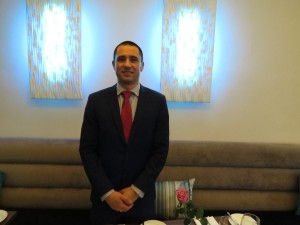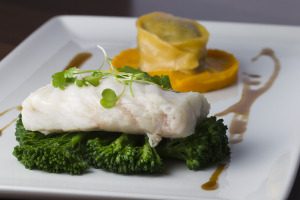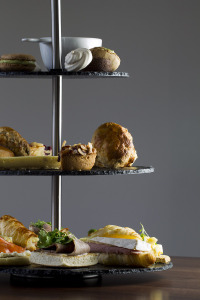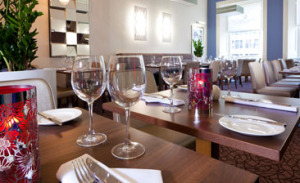 ][1]
][1]
Dominic Kutschera is the General Manager at Hotel Indigo on Edinburgh’s York Place. As well as running the hotel, his responsibilities include looking after Turquoise Thistle, the hotel’s modern Scottish restaurant. Dominic has been at Hotel Indigo since it opened in March 2012.
Born in South America, raised in Switzerland and based in Edinburgh for the last seven years, Dominic studied hospitality management in Switzerland.
In this latest Chewin’ the Fat interview, Dominic discusses Scottish produce, different style of service and alligator meat.
Who comes to Turquoise Thistle restaurant?
DK: It is a wide spread of people but mainly locals. I would say around 70-75% of our restaurant guests are Edinburgh residents. They maybe live nearby or are going to a show at the Playhouse.
As a brand, Hotel Indigo is all about the neighbourhood. So each hotel has a neighbourhood story and each one has a different feel. Hotel Indigo in Glasgow has lots of portraits of Glaswegian actors, comics and authors.
This Hotel Indigo is decorated with photos and pictures of Edinburgh landmarks such as the oil painting of Arthur’s Seat we commissioned from an Edinburgh art student. The book case in the lobby is filled with novels by Edinburgh authors and, of course, the restaurant is called the Turquoise Thistle after the national emblem of Scotland. The food we serve is local cuisine made with Scottish produce and that is reflected in our customer base.
How would you describe the food at Turquoise Thistle?
DK: Scotland does great fish, meat and vegetables and they are at the heart of what we do. Our menus are seasonal. At the moment, it is mainly winter warmers, hearty dishes. We try and find old Scottish recipes and modernise them. So we might do, say, potato rumbledethumps but, instead of serving a heap of crushed potatoes and leeks, we serve it as an elegant starter with gravadlax. Modern Scottish cooking is how I would describe it.
 ][4]
][4]Do customers appreciate the fact that the food is local?
DK: Very much so. We use steak from Buccleuch estate. It is aged for 35 days. It is fantastic meat and our guests give us great feedback on it. They often ask what marinade we use and there isn’t one. It’s simply the taste of the meat.
It will soon be Valentine’s Day. What is happening in the restaurant?
DK: We’re offering any two courses from the a la carte menu with a chocolate fondant to share for dessert. Sharing food is always romantic.
You’ve worked in Switzerland and you have been in Edinburgh for seven years. Is there much difference between Swiss customers and UK customers in terms of expectations?
DK: All customers these days are much more knowledgeable when it comes to hotels and especially restaurants. With all the celebrity chefs and cooking programs, guests know a lot more about what is good cooking and what isn’t.
What is different are the styles of service. What I like about the UK, and Scotland in particular, is that the style of service is quite laidback. It is professional but you can build a more personal relationship than in Switzerland where the service tends to be more formal and professionally distant.
What sparked your interest in the hospitality industry?
DK: When I was growing up, I travelled a lot with my family and saw lots of different countries. I have a childhood memory of seeing a waiter at a pizzeria carrying eight huge pizzas. As a child, that fascinated me and I remember thinking that’s a skill I would like to have. It was almost as though he was juggling them.
I also love food. I cook a lot at home and I like to try new things and push the boundaries. I had a phase where I was trying to do molecular gastronomy. It was almost lab coat and goggles stuff.
To be honest, it was easier doing drinks in that style than food. When we opened the hotel we served deconstructed Cuba Libre cocktails. We made coke and lime spheres in a shot of rum. They looked spectacular.
What trends or changes have you noticed in the city’s restaurant scene since moving here?
DK: Since I moved to Edinburgh, I think that two more restaurants have been awarded Michelin stars. I used to live in Leith and my favourite place was and still is Tom Kitchin’s restaurant. I’ve been to his first restaurant a number of times now. It’s great cooking – fantastic produce, treated the way it should be treated.
What do you cook when you have a night off?
DK: I like venison. Being Swiss, I like German cooking and venison goes very well with ingredients like red cabbage and an almost sweet sauce. I like my home cooking. If I cook something like spaetzle then that reminds me of home.
What is the most exotic thing you have eaten?
DK: I have eaten alligator. A friend of the family has a cattle farm in South America. There are lagoons on the farm with alligators and you have to keep their numbers down as they eat the cattle. Alligator tail costs like a cross between chicken and fish. It has a texture like monkfish, firm flesh.
 ][5]
][5]You can have anyone in the word to cook for you. Who is in the kitchen?
DK: Paul Bocuse. He is the father of chefs. I would love to see what he could do. And Heston Blumenthal. I would be very keen to see what he could conjure up. I like the idea of food being more than simply eating, of it being an experience.
When I was in Switzerland, I ate in a restaurant called the Blind Cow. It is run by blind people and guests dine in the dark. It is very strange. It shows you how little you use your sense of smell and taste. You think you are eating one thing and, at the end, when the lights go up and you see the menu, you realise you have eaten something else altogether.
What feature of your job gets you out of bed in the morning?
DK: It’s a very directly rewarding job. Guests will tell you when they are happy and they will tell you when they are not. Problem solving is one of the largest parts of the job. When you turn a situation around and get good feedback, that is very rewarding.
What has been your strangest customer complaint?
DK: We did have a guest asking why her salsa verde was so green. That was an interesting one. Quite often, dealing with complaints or queries is about asking questions and finding out what the guest expected.
 ][6]
][6]
